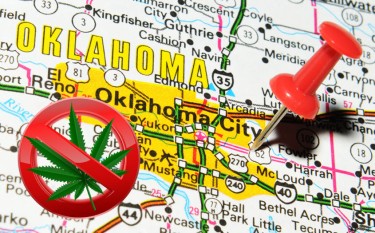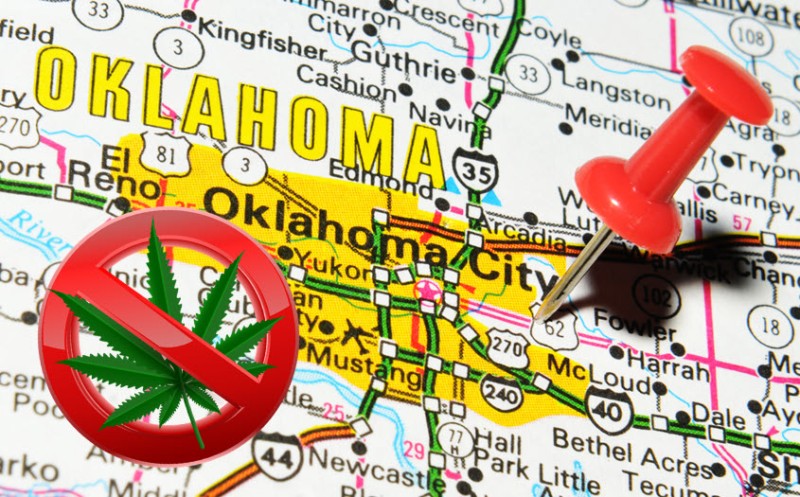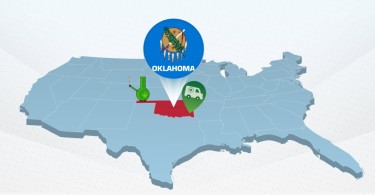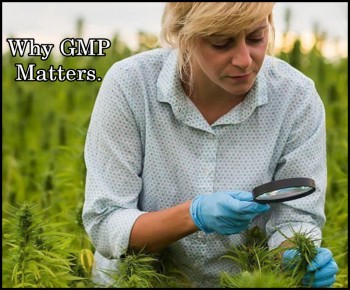
2022 Cannabis Measure Gets No Dice From Oklahoma Supreme Court
The Supreme Court of Oklahoma refused to get involved in the case of a state question to make recreational cannabis legal as the case still faces legal obstacles, making it appear doubtful that the state question will appear on the November ballot. Oklahoma did become the 30th state to legalize medical marijuana in 2018.
Justices postponed action in a case that involves State Question 820 in a 5-4 decision released on Tuesday until the proposal has passed a 10-day window during which anybody can contest the 117,257 valid signatures the campaign gathered to be eligible for a statewide vote or the ballot title.
To guarantee that its state question appears on the ballot this year, the 'Yes on 820' campaign urged the court to intervene. The court's interim inaction may make it unlikely that voters would determine SQ 820 this autumn because of a recently passed window to prepare the November ballot, which campaign officials saw as a positive indication.
Michelle Tilley, the director of the 'Yes on 820' campaign, was hopeful that the SQ 820 will still be on this year's ballot. When the protest time is up, it seems the Court will have the ability to order SQ 820 to be placed on the ballot, she added. She said they are hopeful that the Supreme Court of the state will authorize State Question 820 to be placed on the ballot for the general election of 2022 because we are convinced that our over 117,000 legitimate signatures will survive the 10-day protest process.
The deadline for placing a state question on the ballot in November, according to the State Election Board, expired this past Monday. Last week, as that deadline drew near, the campaign sought the court to direct the Election Board to prepare ballots that included SQ 820, even though the measure still needed to pass certain procedural requirements.
SQ 820 would legalize cannabis for recreational use for adults 21 and older and introduce changes to the criminal justice system that would let some drug offenders appeal some marijuana-related convictions.
PETITIONS AGAINST THE BALLOT
Two different legal objections to the ballot title, paving the way for a vote in the state’s subsequent main or special edition were also overturned by judges.
Although the secretary of state had verified that advocates had submitted enough legal signatures to be eligible, authorities claimed that the campaign violated procedural timeframes for the 2022 election, leading to the lawsuit that the state Supreme Court has been reviewing for the past few weeks until this decision.
The campaign had asked the court to order the state to place SQ 820 on the November ballot, but the court has now formally rejected that request.
Given the time limits and the reality that there remain two legal concerns that need to be properly resolved, the justices ruled in a unanimous 9-0 judgment that the petitioners cannot claim that they have a definite right to get SQ820 on the public election ballot of November 2022 under state laws.
During the 10-day challenge process, four petitions were submitted opposing the campaign; two of them disputed the validity of the certified signatures, while the other two demanded changes to the title and description of the ballot which the state attorney general had given to the campaign.
The court had earlier dismissed the allegations about signatures, and on Wednesday it rejected rehearing requests. The challengers can still submit petitions for rehearings this coming week, but the justices dismissed the objections to the summary language.
The ruling states that the potential for rehearings prevents the Court from properly resolving the matter in line with the statute. The Governor and the Secretary of State are thus prevented from completing the necessary actions to place the initiative on the ballot this year as a result.
NOT ENOUGH TIME
As opposed to temporarily postponing the case, Justice Dustin Rowe stated in a dissenting opinion that he would have rejected the campaign's motion because the Election Board had already begun producing the general election ballots to meet a deadline of September 23 for sending them to foreign and military voters.
Delaying this issue, which could lead to revisions to ballots that have already started to be created, compromises the Election Board's ability to uphold its legal duty to voters and jeopardizes the voting rights of some members of the public, particularly our servicemen and women overseas, he said.
The state also said in court documents that altering ballots after they had already been printed by the Election Board may require the office to restart, which might result in Oklahoma missing deadlines for distributing absentee ballots as required by law. If SQ 820 has not cleared all formal requirements by the time the Election Board begins producing ballots, the attorney general's office asserts that neither state law nor the Oklahoma constitution mandate that the item appear on this year's ballot.
If SQ 820 doesn't appear on the November ballot, it might, assuming it survives any potential legal challenges, be put to a vote by a statewide election by 2024. Although it is uncommon, the governor could call a special election before 2024.
CANNABIS SUPPORTERS BLAME THE NEW SIGNING SYSTEM FOR THE DELAY
The Yes on 820 campaign charged that the new signature-verification procedure instituted by the secretary of state had slowed down its efforts to secure a spot on the November ballot. The campaign claimed that because these tasks were contracted out to a business connected to a political polling agency, the procedure to count and validate signatures took far longer.
According to a statement from Jeffrey Cartmell, the secretary of state's legal advisor, the secretary of state's office kept in touch with SQ 820 supporters and looks forward to continued collaboration with them and others to enhance this new signature-verification procedure.
According to Cartmell, the new procedure gives the signature-counting procedure additional attention. To qualify on the ballot, state question campaigns in Oklahoma must collect a particular number of signatures from registered voters.
BOTTOM LINE
Residents of Oklahoma, especially cannabis users were excited at the prospect of finally getting to vote for the legalization of recreational cannabis in the state, but due to a delay in validating and counting the number of gathered signatures, the residents would have to wait till 2024 general elections before the sate queso can be put in the ballot.






